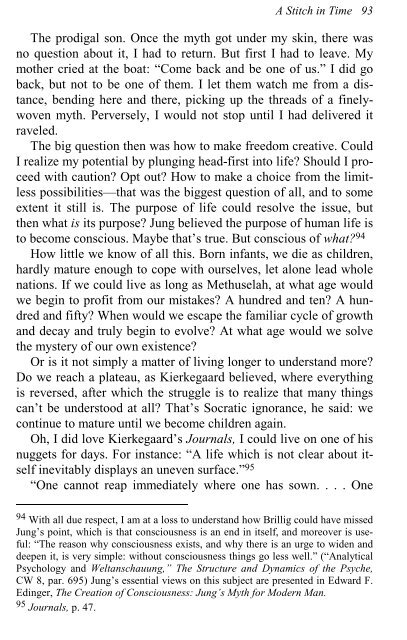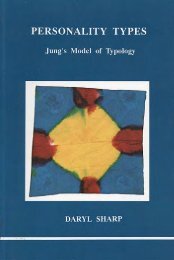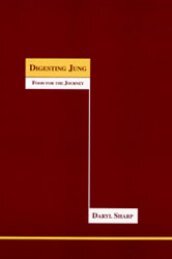Chicken Little: The Inside Story (A Jungian ... - Inner City Books
Chicken Little: The Inside Story (A Jungian ... - Inner City Books
Chicken Little: The Inside Story (A Jungian ... - Inner City Books
Create successful ePaper yourself
Turn your PDF publications into a flip-book with our unique Google optimized e-Paper software.
A Stitch in Time 93<br />
<strong>The</strong> prodigal son. Once the myth got under my skin, there was<br />
no question about it, I had to return. But first I had to leave. My<br />
mother cried at the boat: “Come back and be one of us.” I did go<br />
back, but not to be one of them. I let them watch me from a distance,<br />
bending here and there, picking up the threads of a finelywoven<br />
myth. Perversely, I would not stop until I had delivered it<br />
raveled.<br />
<strong>The</strong> big question then was how to make freedom creative. Could<br />
I realize my potential by plunging head-first into life? Should I proceed<br />
with caution? Opt out? How to make a choice from the limitless<br />
possibilities—that was the biggest question of all, and to some<br />
extent it still is. <strong>The</strong> purpose of life could resolve the issue, but<br />
then what is its purpose? Jung believed the purpose of human life is<br />
to become conscious. Maybe that’s true. But conscious of what? 94<br />
How little we know of all this. Born infants, we die as children,<br />
hardly mature enough to cope with ourselves, let alone lead whole<br />
nations. If we could live as long as Methuselah, at what age would<br />
we begin to profit from our mistakes? A hundred and ten? A hundred<br />
and fifty? When would we escape the familiar cycle of growth<br />
and decay and truly begin to evolve? At what age would we solve<br />
the mystery of our own existence?<br />
Or is it not simply a matter of living longer to understand more?<br />
Do we reach a plateau, as Kierkegaard believed, where everything<br />
is reversed, after which the struggle is to realize that many things<br />
can’t be understood at all? That’s Socratic ignorance, he said: we<br />
continue to mature until we become children again.<br />
Oh, I did love Kierkegaard’s Journals, I could live on one of his<br />
nuggets for days. For instance: “A life which is not clear about itself<br />
inevitably displays an uneven surface.” 95<br />
“One cannot reap immediately where one has sown. . . . One<br />
94 With all due respect, I am at a loss to understand how Brillig could have missed<br />
Jung’s point, which is that consciousness is an end in itself, and moreover is useful:<br />
“<strong>The</strong> reason why consciousness exists, and why there is an urge to widen and<br />
deepen it, is very simple: without consciousness things go less well.” (“Analytical<br />
Psychology and Weltanschauung,” <strong>The</strong> Structure and Dynamics of the Psyche,<br />
CW 8, par. 695) Jung’s essential views on this subject are presented in Edward F.<br />
Edinger, <strong>The</strong> Creation of Consciousness: Jung’s Myth for Modern Man.<br />
95 Journals, p. 47.










